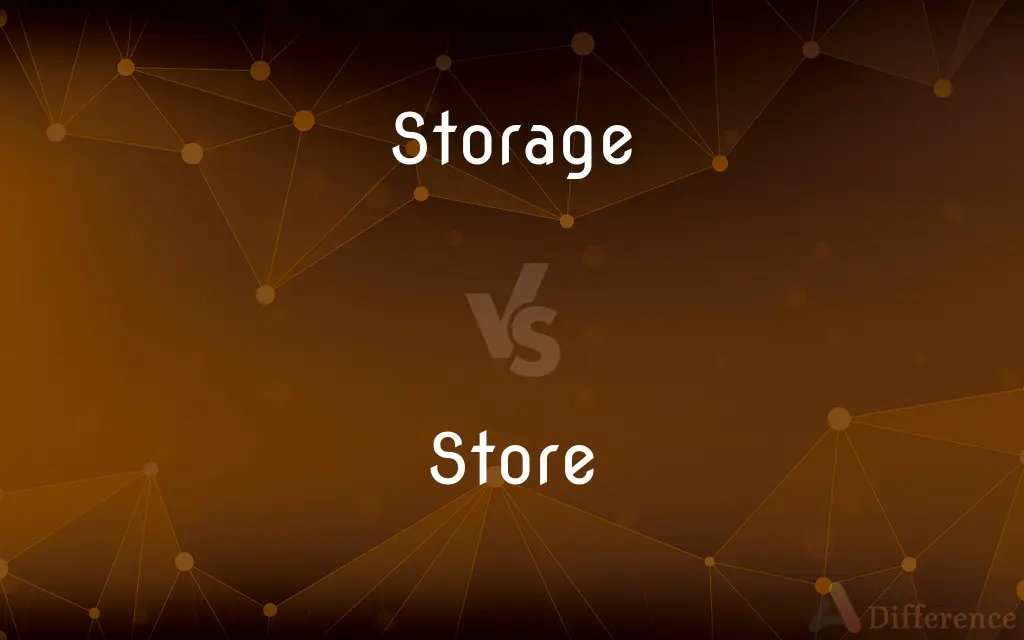Storage vs. Store — What's the Difference?
By Maham Liaqat & Urooj Arif — Updated on March 28, 2024
Storage refers to the space or process for keeping things, while store involves the act of keeping or the place where items are sold.

Difference Between Storage and Store
Table of Contents
ADVERTISEMENT
Key Differences
Storage typically denotes the allocation of space or method for safely keeping goods, information, or data, emphasizing the aspect of preservation and organization. Whereas, store can refer to the act of keeping something for future use or a retail establishment that sells goods, highlighting the action of retaining or the commercial context.
In terms of function, storage is primarily concerned with the maintenance and holding of items or data in a way that ensures their safety and future accessibility. On the other hand, to store something is to actively place or keep it in storage, which can be a temporary or long-term action depending on the context.
When discussing digital or electronic contexts, storage gains a specific meaning related to data preservation, such as hard drives or cloud storage. Store, in this context, might refer to saving data, but can also denote an online platform for purchasing software or digital goods, illustrating the dual nature of "store."
The concept of storage is inherently passive, focusing on the condition or capability of a space or medium to hold items. Store, however, implies an active process or place of business, indicating either the action of depositing goods for future use or the physical or online venue where transactions occur.
Storage can be seen as a more general term that applies to a wide range of contexts, from physical goods to digital data. Store, while it can be used broadly, often carries a commercial connotation or indicates the specific act of putting away.
ADVERTISEMENT
Comparison Chart
Meaning
Space or method for keeping goods or data
Act of keeping or retail establishment
Context
Preservation, organization
Retention, commerce
Function
Maintenance and holding of items
Placing items in storage or selling goods
Application
Wide-ranging (physical and digital)
Specific (keeping or commercial)
Focus
Capacity to hold
Active process or business location
Compare with Definitions
Storage
The act of keeping or the state of being kept.
We need more storage for our files.
Store
To put or keep things for future use.
We store our holiday decorations in the basement.
Storage
Space available for storing something.
The attic provides additional storage.
Store
An online platform for purchasing applications or media.
He downloaded the app from the store.
Storage
A place where things are or can be stored.
They rented a storage unit for their furniture.
Store
A retail establishment selling items.
She visited the store to buy groceries.
Storage
The capability of a system to hold information.
This device has 256GB of storage.
Store
The state of being kept in a particular place.
The wine is stored at an ideal temperature.
Storage
The process of retaining digital data.
Data storage is crucial for our project.
Store
The act of saving data in computing.
The program stores your progress automatically.
Storage
The action or method of storing something for future use
The room lacked storage space
The chair can be folded flat for easy storage
Store
A place where merchandise is offered for sale; a shop.
Storage
The act of storing goods or the state of being stored.
Store
A stock or supply reserved for future use
A squirrel's store of acorns.
Storage
A space for storing goods.
Store
Stores Supplies, especially of food, clothing, or arms.
Storage
The price charged for keeping goods stored.
Store
A place where commodities are kept; a warehouse or storehouse.
Storage
The charging or regenerating of a storage battery.
Store
A great quantity or number; an abundance.
Storage
(Computers) The part of a computer that stores information for subsequent use or retrieval.
Store
To reserve or put away for future use.
Storage
(uncountable) The act of storing goods; the state of being stored.
There's a lot of storage in the loft.
Store
To fill, supply, or stock.
Storage
An object or place in which something is stored.
Store
To deposit or receive in a storehouse or warehouse for safekeeping.
Storage
Any computer device, including such as a disk, on which data is stored for a longer term than main memory.
I′d recommend backing up these files to storage before reinstalling the operating system.
Store
(Computers) To copy (data) into memory or onto a storage device, such as a hard disk.
Storage
(uncountable) The price charged for storing goods.
Store
A place where items may be accumulated or routinely kept.
This building used to be a store for old tires.
Storage
To put into storage; to store.
Store
A supply held in storage.
Storage
The act of depositing in a store or warehouse for safe keeping; also, the safe keeping of goods in a warehouse.
Store
(mainly North American) A place where items may be purchased; a shop.
I need to get some milk from the grocery store.
Storage
Space for the safe keeping of goods.
Store
Memory.
The main store of 1000 36-bit words seemed large at the time.
Storage
The price changed for keeping goods in a store.
Store
A great quantity or number; abundance.
Storage
The act of storing something
Store
A head of store cattle (feeder cattle to be sold to others for finishing); a store cattle beast.
Storage
A depository for goods;
Storehouses were built close to the docks
Store
(transitive) To keep (something) while not in use, generally in a place meant for that purpose.
I'll store these books in the attic.
Storage
The commercial enterprise of storing goods and materials
Store
Contain.
The cabinets store all the food the mice would like.
Storage
(computer science) the process of storing information in a computer memory or on a magnetic tape or disk
Store
Have the capacity and capability to contain.
They sell boxes that store 24 mason jars.
Storage
An electronic memory device;
A memory and the CPU form the central part of a computer to which peripherals are attached
Store
To write (something) into memory or registers.
This operation stores the result on the stack.
Storage
Depositing in a warehouse
Store
That which is accumulated, or massed together; a source from which supplies may be drawn; hence, an abundance; a great quantity, or a great number.
The ships are fraught with store of victuals.
With store of ladies, whose bright eyesRain influence, and give the prize.
Store
A place of deposit for goods, esp. for large quantities; a storehouse; a warehouse; a magazine.
Store
Any place where goods are sold, whether by wholesale or retail; a shop.
Store
Articles, especially of food, accumulated for some specific object; supplies, as of provisions, arms, ammunition, and the like; as, the stores of an army, of a ship, of a family.
His swine, his horse, his stoor, and his poultry.
In his needy shop a tortoise hung,An alligator stuffed, and other skinsOf ill-shaped fishes; and about his shelvesA beggarly account of empty boxes.
Sulphurous and nitrous foam, . . . Concocted and adjusted, they reducedTo blackest grain, and into store conveyed.
Store
Accumulated; hoarded.
Store
To collect as a reserved supply; to accumulate; to lay away.
Dora stored what little she could save.
Store
To furnish; to supply; to replenish; esp., to stock or furnish against a future time.
Her mind with thousand virtues stored.
Wise Plato said the world with men was stored.
Having stored a pond of four acres with carps, tench, and other fish.
Store
To deposit in a store, warehouse, or other building, for preservation; to warehouse; as, to store goods.
Store
A mercantile establishment for the retail sale of goods or services;
He bought it at a shop on Cape Cod
Store
A supply of something available for future use;
He brought back a large store of Cuban cigars
Store
An electronic memory device;
A memory and the CPU form the central part of a computer to which peripherals are attached
Store
A depository for goods;
Storehouses were built close to the docks
Store
Keep or lay aside for future use;
Store grain for the winter
The bear stores fat for the period of hibernation when he doesn't eat
Store
Find a place for and put away for storage;
Where should we stow the vegetables?
I couldn't store all the books in the attic so I sold some
Common Curiosities
How does store differ from storage in computing?
In computing, store often refers to the act of saving data, while storage denotes the capacity or space for data.
What types of stores are there?
There are various types of stores, including brick-and-mortar retail stores, online stores, and specialty stores.
What is the primary purpose of storage?
The primary purpose of storage is to keep goods, information, or data safely for future use.
Can storage be used to refer to memory?
Yes, in the context of computing, storage can refer to memory or space where data is kept.
What makes a good storage system?
A good storage system is secure, efficient, accessible, and scalable to meet future needs.
Are warehouses considered storage?
Yes, warehouses are large-scale commercial spaces used specifically for storage of goods.
Is cloud storage considered a store?
Cloud storage is considered a form of digital storage space, not a store in the commercial sense.
Can a store also mean storage?
Yes, in a less common usage, store can mean storage, particularly when referring to the place where items are kept.
What role does storage play in logistics?
Storage plays a critical role in logistics by providing spaces to keep goods before they are distributed.
What does it mean to store data?
To store data means to save it in a digital form for future access or use.
Is it important where items are stored?
Yes, the location and conditions of storage can affect the preservation and quality of stored items.
How do storage needs change over time?
Storage needs can increase with the accumulation of more items or data, necessitating larger or more efficient storage solutions.
How do people usually decide on storage solutions?
Decisions on storage solutions are often based on the amount, type of items or data, and the desired access speed.
What factors influence the choice of a store for shopping?
Factors include product range, price, location, customer service, and the shopping experience.
What is an example of a store in the digital world?
An example is an app store, where users can purchase and download software.
Share Your Discovery

Previous Comparison
Dig vs. Excavation
Next Comparison
Injury vs. HarmAuthor Spotlight
Written by
Maham LiaqatCo-written by
Urooj ArifUrooj is a skilled content writer at Ask Difference, known for her exceptional ability to simplify complex topics into engaging and informative content. With a passion for research and a flair for clear, concise writing, she consistently delivers articles that resonate with our diverse audience.














































